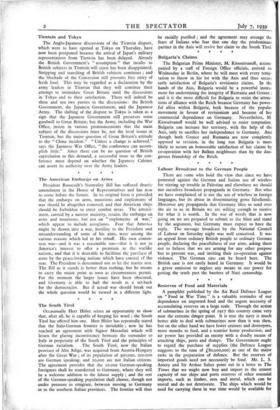The American Embargo on Arms President Roosevelt's Neutrality Bill has
suffered drastic amendment in the House of Representatives and has now to come before the Senate. In its original form it provided that the embargo on arms, munitions and implements of war should be altogether removed, and that American ships should be forbidden to enter combat areas. The amend- ment, carried by a narrow majority, retains the embargo on arms and munitions, but not on " implements of war," which appear to include aeroplanes. Fear that America might be drawn into a war, hostility to the President and misunderstanding of some of his aims, were among the various reasons which led to his rebuff. His own conten- tion was—and it was a reasonable one—that it is not to America's interest to offer a premium to the warlike nations, and that it is desirable to facilitate the purchase of arms by the peace-loving nations which have control of the seas. The President is determined not to let the matter rest. The Bill as it stands is better than nothing, but he means to carry the major point as soon as circumstances permit. For the moment the larger issues have been obscured, and Germany is able to hail the result as a set-back for the democracies. But if actual war should break out the whole question would be viewed in a different light.
* * * *










































 Previous page
Previous page